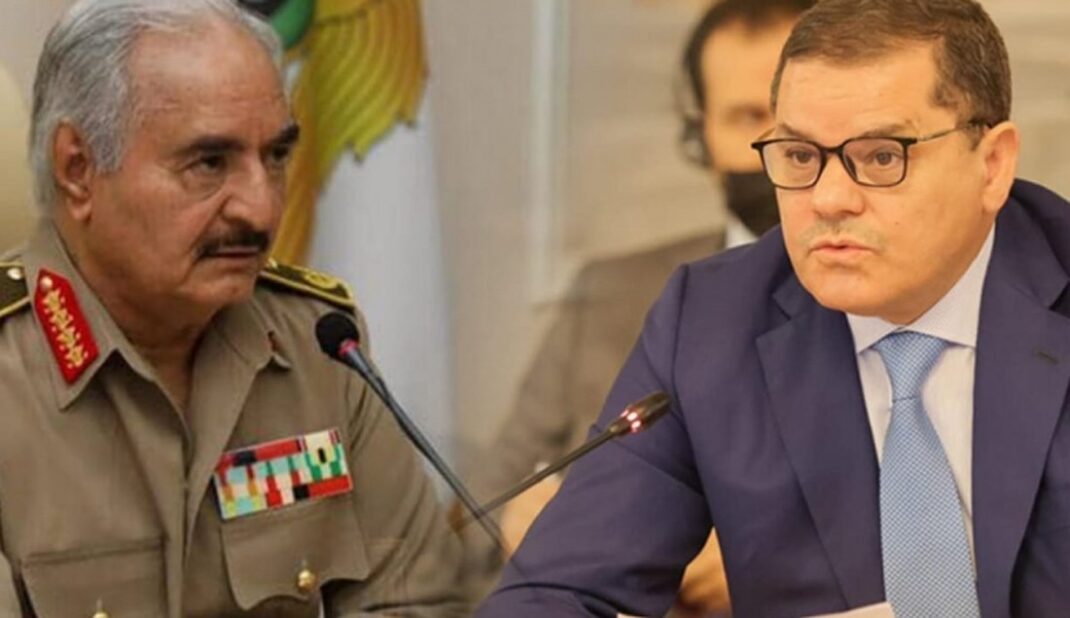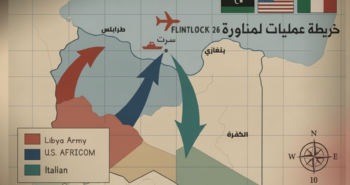Federica Saini Fasanotti

The intense rivalries, power struggles among militias and shifting regional dynamics are casting a shadow over the country’s prospects of ever achieving unity again.
he divisions in Libya’s political landscape are becoming rigid and permanent. Recent clashes in Tripoli, particularly the late September fighting triggered by competing appointments to a top security position, highlight just how volatile the situation remains. Libyan Prime Minister Abdul Hamid Dbeibeh’s push to dismantle militias disloyal to his Government of National Unity (GNU) has disrupted already-fragile power-sharing agreements and sparked armed confrontations in the capital.
Italy, Turkiye and the European Union are keeping a close eye on the situation, as Libya’s turmoil directly affects their strategic interests, from migration and energy security to regional influence.
Dbeibeh vs. Haftar: Libya’s enduring power stalemate
At the heart of Libya’s political paralysis is the enduring rivalry between Prime Minister Dbeibeh, based in Tripoli in the west of the country, and Field Marshal Khalifa Haftar, who holds power in the east. This clash of authority pits the UN-recognized GNU in Tripoli against Mr. Haftar’s Libyan National Army (LNA). The LNA operates from its regional stronghold in Cyrenaica, while Tobruk serves as its political center and houses the parallel administration known as the House of Representatives.
Neither side has the strength to unify the country completely, yet both possess enough military and financial clout to undermine any solution that threatens their position. This dynamic has led to a frozen stalemate in which no faction can prevail, but each can still impede progress toward peace. Field Marshal Haftar’s attempted offensive on Tripoli in 2019 showcased his ambition to seize the capital by force. Although Turkiye’s military intervention foiled that assault, Mr. Haftar entrenched himself in the east and reinforced his influence by appointing loyalists, including his sons, to crucial positions.
In the west, Prime Minister Dbeibeh’s mandate has officially lapsed since 2021, and his authority barely reaches beyond the patchwork of militias that only somewhat recognize the GNU. Their rivalry continues to be a significant barrier to achieving any form of national reconciliation. Efforts from the international community – ranging from United Nations roadmaps to regional mediation – continually falter, caught in the trap of this zero-sum contest for power.
Fragile militia alliances and unstable security
The leadership rivalry is further complicated by the fragmented and unstable nature of the country’s security landscape. Militias are the real power brokers, and today’s ally can swiftly turn into tomorrow’s adversary. This year’s clashes in Tripoli have sharply highlighted how quickly a militia, once considered loyal, may turn against the government if its own interests are jeopardized.
In May, the assassination of a prominent militia leader, Ghnewa al-Kikli, sent the capital spiraling into its worst violence in years. Although a ceasefire eventually restored a shaky semblance of calm, tensions flared again by September. This resurgence of fighting was sparked when Prime Minister Dbeibeh attempted to curb the influence of the Special Deterrence Force (Radaa), a powerful militia in Tripoli aligned with the Presidential Council. A deal brokered by Turkiye aimed to have Radaa return key sites, such as the airport and Mitiga prison, to state control. However, implementation faltered amid a turf war between the GNU and the Presidential Council.
The feud over rival appointments to head the Judicial Police, one made by Prime Minister Dbeibeh and the other by the Presidential Council, ignited armed street battles on September 21.
Episodes like this underscore the inherent fragility of Libya’s militia-dominated order. Armed groups have divided the country into fiefdoms, controlling airports, ports and oil facilities, which they exploit for financial gain and political influence. Any attempt to alter this precarious balance, whether by disbanding a militia or reassigning its commanders, can shatter the temporary coalitions that pass for stability.
In Tripoli, the GNU relies on a constellation of militia “partners” whose loyalty is transactional. Meanwhile, in the east, Field Marshal Haftar’s LNA holds an uneasy coalition of tribal and Salafist units, similarly bound by convenience. The potential for sudden escalation looms constantly, and each flare-up further erodes public trust and worsens humanitarian conditions.
For Libyan civilians, constant skirmishes between militias means that daily life is often precarious. Armed factions constantly vie for power, showing little consideration for the people caught in the middle. For foreign stakeholders, it means that any diplomatic or economic involvement in Libya is fraught with the potential for disruption.
Turkiye’s expanding role as kingmaker
Turkiye has emerged as the most influential external actor in Libya, with its role evolving rapidly. In 2019-2020, Ankara supported the Tripoli government during a critical moment, deploying military advisors, armed drones and Syrian fighters that helped beat back Field Marshal Haftar’s offensive. In return, Turkiye secured lucrative construction and energy contracts in western Libya, along with a controversial maritime delimitation agreement in 2019 that expanded its claims in the Eastern Mediterranean.
The maritime deal closely tied the Tripoli authorities to Ankara’s strategic vision, often referred to as the “Blue Homeland” doctrine. This move, however, infuriated Greece and Cyprus and was rejected by Mr. Haftar and his foreign backers like Egypt. For a while, Turkiye seemed satisfied as the main supporter of western Libya, solidifying a Misrata-Tripoli-Ankara alliance. Yet, as the Libyan conflict settled into a stalemate, Turkish policymakers began to rethink their approach.
Today, Turkiye is expanding its engagement to hedge its bets across Libya’s divided landscape. Recognizing the limitations of relying solely on the Tripoli faction, Ankara has prudently begun to establish ties with Mr. Haftar and his base in Cyrenaica. Turkish diplomats and business leaders have made high-profile visits to Benghazi and even to Field Marshal Haftar’s stronghold, exploring investment opportunities and fostering political dialogues.
The goal is not to abandon Tripoli, but to gain leverage on both sides of the country’s east-west divide. By engaging with Mr. Haftar’s camp, Turkiye aims to broaden and legitimize the 2019 memorandum of understanding regarding maritime zones, preferably with the endorsement of Cyrenaica. Establishing a potential understanding with Mr. Haftar could also help repair Ankara’s strained relations with Egypt, the field marshal’s primary Arab supporter, ultimately bolstering Turkiye’s regional influence.
Turkiye aims to be the indispensable powerbroker in Libya, positioning itself as the go-to nation able to engage with all factions and shape any political resolution. This expanding footprint presents significant opportunities for Ankara, including securing energy exploration agreements, gaining access to Libya’s vast oil reserves and securing reconstruction contracts. But it also brings inherent risks; Turkiye needs to navigate complex rivalries carefully to avoid overextending itself or provoking a backlash. The choices it makes next will substantially affect the country’s future and the interests of other international players.
Implications for Italy and Europe
Libya’s turmoil presents a complex challenge for both Italy and the EU, blending security threats with strategic opportunities. Rome’s main concerns focus on migration, energy resources and geopolitical influence. The chaos in Libya has significantly driven irregular migration across the central Mediterranean route, a key political issue in Italy. Each new outbreak of violence or breakdown of governance raises the alarming possibility of fresh waves of migrants making their way to Italian shores.
Rome also worries that protracted instability in Libya could provide terrorist groups with a new foothold and disrupt the country’s crucial oil and gas output, which is heavily linked to investments made by the Italian energy company Eni. Conversely, a more stable Libya could offer Italy opportunities to deepen trade ties, secure energy imports and enhance migration cooperation through robust bilateral agreements.
However, Italy’s ability to influence events in Libya has been hampered by the growing presence of other powers, particularly Turkiye and Russia, as well as by Rome’s own difficult compromises. The danger for Italy is that it risks being sidelined in a country it once regarded as part of its sphere of influence. In some instances, Italy has felt it necessary to engage in questionable deals with Libyan factions just to maintain a say in the unfolding situation.
Rome’s approach in the Mediterranean involves delicately balancing cooperation with Turkiye when possible, while also protecting against being squeezed between Turkish and Russian expansionism in North Africa. Its recent efforts to bolster its navy and presence in the Mediterranean are a direct response to this shifting balance of power. Italy sees the southern flank as the focal point of its main strategic threats and interests.
For the European Union, Libya represents both a humanitarian concern and a strategic vulnerability at Europe’s doorstep. The EU officially supports UN-led peace efforts and runs an operation to enforce the arms embargo on Libya, but internal divisions often weaken Europe’s influence. Member states have pursued differing agendas: Italy and Malta focus on migration, engaging with Tripoli on coast guard training, and France has at times courted Mr. Haftar, driven by potential business opportunities in the east. Meanwhile, Greece and Cyprus focus on countering Turkiye’s maritime claims stemming from agreements with Libyan authorities.
The EU’s concerns coalesce around a few key issues. The first is migration: Ongoing instability in Libya means that migrants and refugees continue to use Libyan territory as a launching pad to reach Europe, a situation that EU leaders are eager to manage or control. Second is security: A lawless Libya could become a hotbed for organized crime and terrorism, posing direct threats to Europe through arms smuggling, human trafficking and extremist networks. Third, the presence of Russian mercenaries and military equipment in Haftar-controlled areas is another worrying factor, as it extends Moscow’s influence along the southern edge of the Mediterranean.
Scenarios
Unlikely: National unity and elections
In an ideal scenario, a unified diplomatic effort, perhaps spearheaded by Turkiye, given its unique ties to both camps, successfully bridges the divide between the Dbeibeh-led west and Field Marshal Haftar’s east. A power-sharing agreement is reached, paving the way for a cohesive interim government, finally allowing the long-delayed national elections; Libya has not held such elections since 2014. Bringing an end to the split between Tripoli and Tobruk could help Libya gradually rebuild a unified army and reestablish central control over its resources.
However, the likelihood of this occurring in the near term is slim. Years of distrust and zero-sum politics would need to be overcome, and as of late 2025, adversaries still prioritize maintaining power over compromising.
Most likely: Continued fragmentation and external patronage
The most likely scenario is that Libya remains mired in its post-2014 deadlock. Power remains divided between rival governments in the east and west, resulting in a mosaic of localized ceasefires that, while preventing a full-blown civil war, offer no genuine progress toward unity. Prime Minister Dbeibeh may hold onto his position in the west, while Field Marshal Haftar and his allies sustain their parallel institutions. Militias would continue to clash periodically, especially in the western region, where rivalries within the Tripoli camp simmer. Any new UN peace initiatives would face delays or be undermined by local spoilers.
______________________





